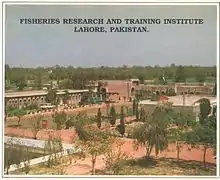Fisheries Research and Training Institute
The Fisheries Research and Training Institute (Urdu: دانش کدہِ تربیت و تحقیقِ ماہی گیری) is a research institution in Lahore, Pakistan.[1] with work centring on inland fisheries and aquaculture in Pakistan. Its role is to promote fisheries and aquaculture in the country. The institute is divided in 7 sections:[2] Aquaculture, Biology and Ecology, Nutrition, Pathology and Disease, Chemistry, Fisheries Management, and Training.
 Fisheries Research and Training Institute, Lahore, Pakistan | |
| Established | 1952 |
|---|---|
| Location | Batapur, Lahore, Pakistan |
| Website | punjabfisheries |
The institute is head by the Director Fisheries (R&T), Punjab Lahore and each section is headed by a Deputy Director Fisheries, each of whom is assisted by Assistant Director Fisheries.
Faculty
| Sr # | Name | Designation | Qualification | Year Joined the Institute |
|---|---|---|---|---|
| 1. | Dr. Sikandar Hayat | Director Fisheries | PhD, M.Phil. | Since 2008 |
| 2. | Dr.Ehsan Mehmood Bhatti | Deputy Director Fisheries | PhD | |
| 3. | Zahid Iqbal Rana | Deputy Director Fisheries | B.Sc. | |
| 4. | Muhammad Azeem Ch. | Deputy Director Fisheries | B.Sc. | |
| 5. | Aftab Zaheer Khan | Deputy Director Fisheries | B.Sc. | |
| 6. | Manzoor Hussain Bhatti | Assistant Director Fisheries | B.Sc. | |
| 7. | Abdul Rehman Makki | Assistant Director Fisheries | B.Sc. | |
| 8. | Tariq Raheed | Botanist | M.Sc. Botany |
Research activities
The institute conducts multidisciplinary research and training activities, with the main objectives in related areas under:[3]
- A. Merits of various aquaculture systems and methods to improve production of commercially important species
- a. Assessment of production potential with various levels of inputs in ponds.
- b. Formulation of low cost balanced feed.
- c. Breeding, selection and mass rearing.
- d. Diseases and their prevention.
- e. Pond engineering and water dynamics
- f. Fish production as a component of an integrated farming system.
- B. Biology and ecology of selected species of commercial importance
- a. Studies on food, feeding, reproduction, spawning, life cycles and behavior of selected species.
- b. Migration patterns of migrating species.
- C. Post-harvest technology for fish
- D. Management systems for lakes and reservoirs to improve fish production
- E. Control of pollution as affecting naturally occurring fish population
- F. Fisheries economics and marketing
- G. Studies of the socio-economic conditions of fishermen and fish farmers
Training
The institute organizes short and long term specialized training courses of a multidisciplinary nature covering the basic and applied aspects of Fisheries and Aquaculture for pre-service and in-service Fisheries personnel and private entrepreneurs.[4] These courses include:
- Pre promotion course for Director Fisheries
- Pre promotion course for Deputy Director Fisheries
- Pre promotion course for Assistant Director Fisheries
- Pre promotion course for Fisheries Research Assistant
References
- "ISESCO Center for promotion of Science". ISESCO Center for promotion of Science. Retrieved 23 March 2014.
- "Punjab Fisheries Department" (PDF). Punjab Fisheries Department. Retrieved 23 March 2014.
- "Fisheries: Portal". Government of the Punjab. Retrieved 23 March 2014.
- "Directorte". Government of the PUnjab. Archived from the original on 23 March 2014. Retrieved 23 March 2014.